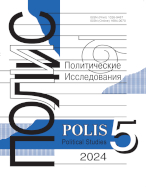Political Culture of Modern Russia:
Images of the New Russian Power and the Social Splits
Glebova I.I.,
Dr. Sci. (Pol. Sci.), Professor, INION RAS
DOI: 10.17976/jpps/2006.01.03
Glebova I.I. Political Culture of Modern Russia: Images of the New Russian Power and the Social Splits . – Polis. Political Studies. 2006. No. 1. https://doi.org/10.17976/jpps/2006.01.03
The motif of the article is to substantiate the thesis that Russia’s Westward drift that was going on in the 1990s has not resulted in the appearance of the civil form of life on Russian soil, which would base itself on a liberal political and economic system. In the author’s estimation, during the past two decades, a new type of sociality has taken shape in our country, which presents a complex “alloy” of modernity with elements of the past. One of the main characteristics of this new sociality is coexistence of two mutually inimical ways of cultural disposition. It is argued in the article that in a situation of wide split, with the irreconcilable, antagonistic character of the main subcultures’ mutual relations, it is no other actor than supreme power that consolidates society, keeps together its components. Such split makes the power (as reality and as imaginary phenomenon) absolutely needed for the socium, thus reproducing the principle of social integration “from top downwards”, traditional for Russia.
See also:
Sokolov M.M.,
The Russian National Unity: Analysis of the Political Style of a Radical-Nationalist Organization. – Polis. Political Studies. 2006. No1
Pivovarov Yu.S.,
Russian Power and Public Policy (A Historian’s Notes about the Reasons of Unsuccess of the Democratic Transit). – Polis. Political Studies. 2006. No1
Kazantzev A.A.,
Three Scenarios of a “Coloured” Revolution in Russia (Modelling the Net Dynamics of the Russian Polity). – Polis. Political Studies. 2006. No1
Rzheshevsky G.A.,
Democracy: Myth, Reality, or Boosted Brand?. – Polis. Political Studies. 2008. No5
DOSSIER: SOCIAL PROTECTION. – Polis. Political Studies. 1991. No6





.jpg)






 print
print
.jpg)
.jpg)